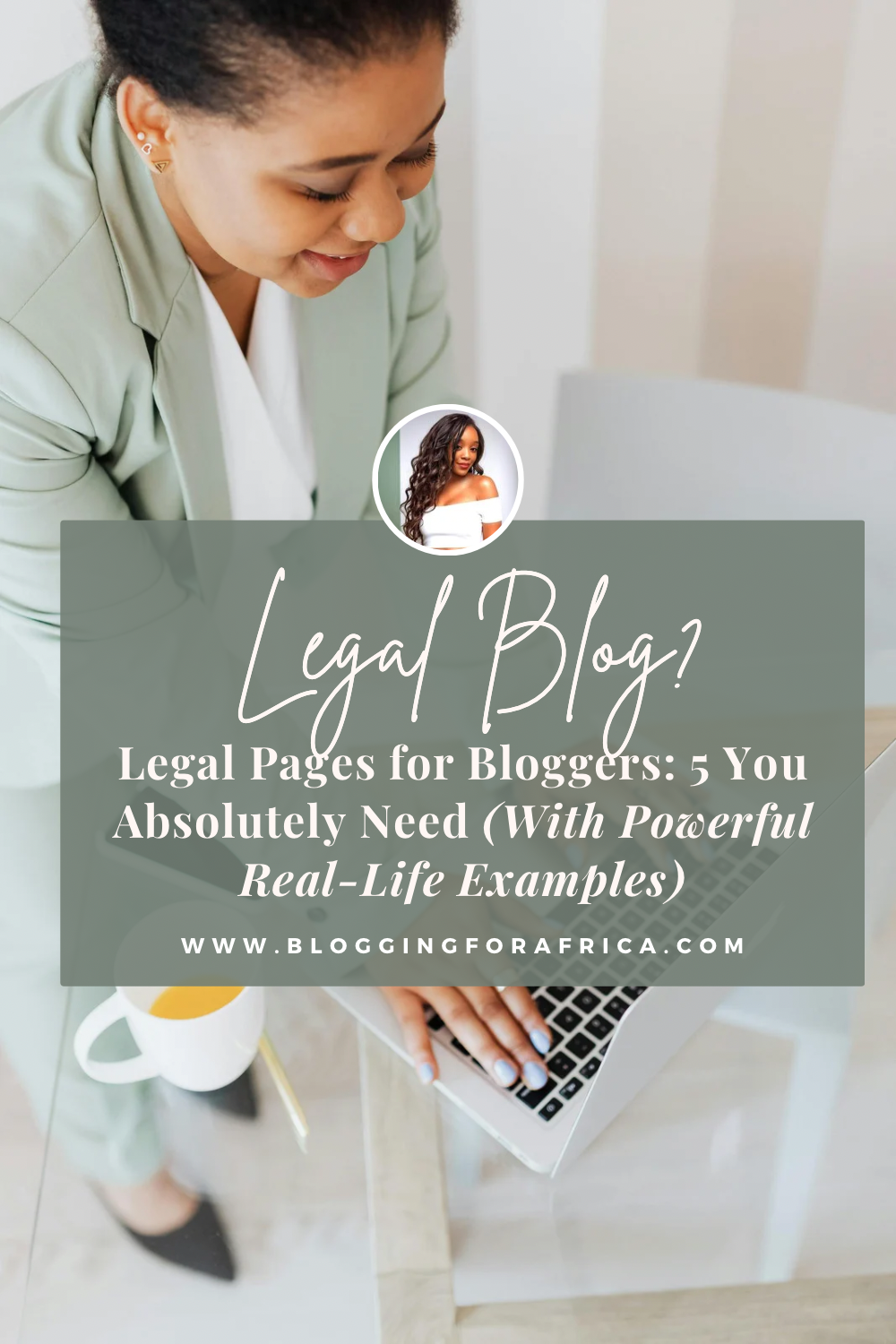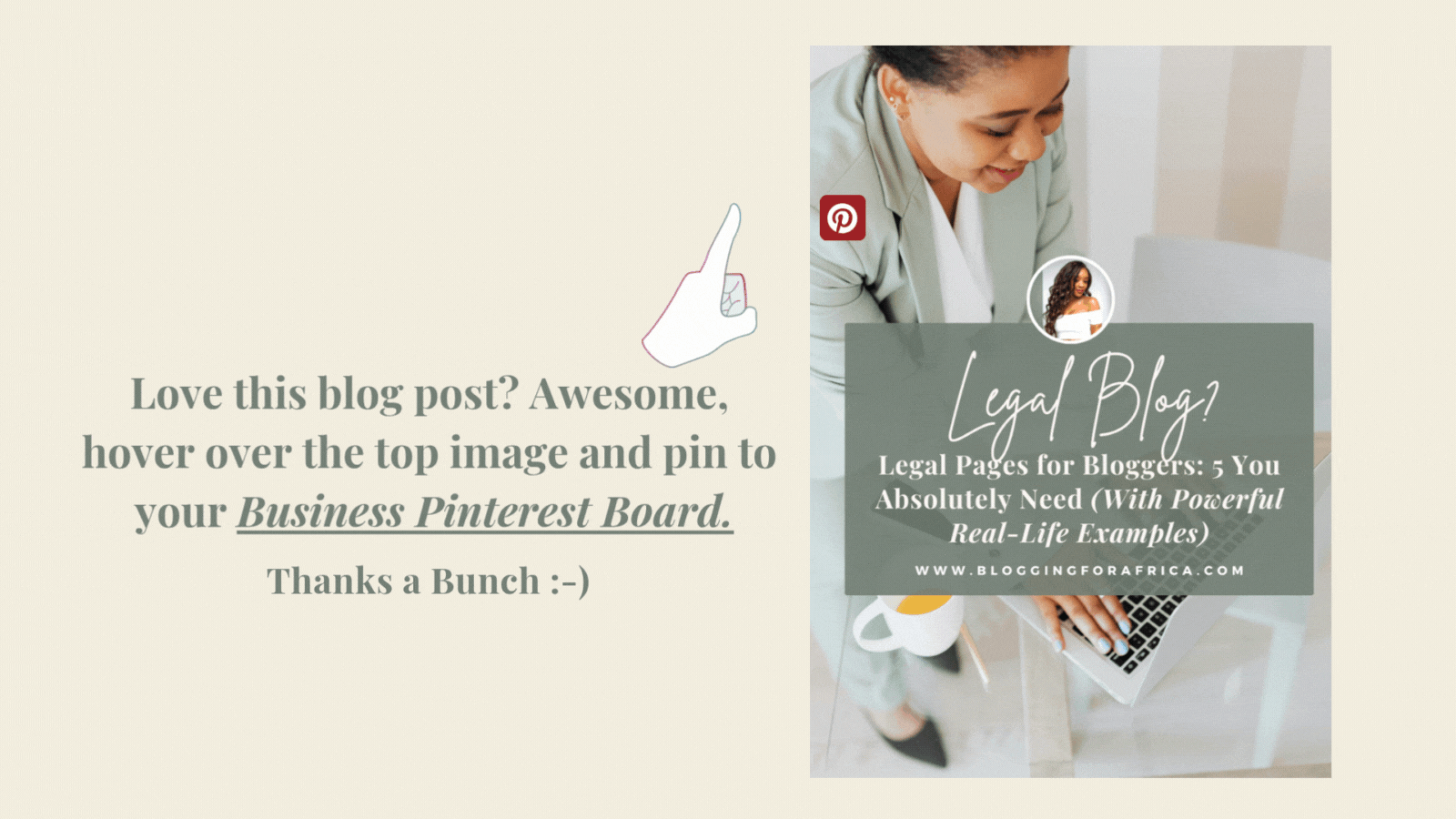Legal Pages for Bloggers: 5 Must Haves (With Powerful Examples)
May 21, 2025

Legal Pages for Bloggers: 5 Must Haves (With Powerful Examples).
Heyyy love bug — we’re back, and today? It’s giving blazer vibes. And why? 💃🏽Because we’re diving into THE one thing your site needs to level up from “just blogging” to real business vibes.
Now yes, I talk about design a lot (and rightfully so — it matters big time when building your site).
But even more important than fonts or layouts?
Legal pages or should I say legal pages for bloggers.
Because let’s be real — in business, things can get unnecessarily sticky real fast.
And if your website isn’t legally protected? Whew, chile… it could cost you.
And like we always say around here: don’t nobody have time for that.
Especially when it can be avoided.
And this, friend? This is the “avoid it” part.
So before you post that amazing content or launch your next offer — which I know you can’t wait to do (cheers in advance, by the way 🥂)…
Let’s first make sure your foundation is solid.
We’re talking legal pages — in the simplest way possible.
And stick around, because I’ll be giving real examples for each and explaining why they matter.
Why? Because I want you to leave this post feeling fully equipped — with at least the basics to create your legal pages the right way.

📌 Love this post? Save it to your Business Pinterest Board for later!
⚖️ Quick disclaimer: I am not a lawyer, and this post does not serve as legal advice. I’m simply sharing trusted templates and resources that can serve as helpful starting points for content creators and online business owners. Please do your own research or consult a licensed attorney to ensure your legal pages meet the specific needs of your business. You can read my full disclaimer right here.
Alright love bug — let’s dive in 🥂
So yes — there are probably a plethora of legal documents you could add to your website. And the truth is, as your business grows, you’ll likely find yourself adding new ones — especially as new laws, rules, and regulations roll out.
But this blog post, friend?
We’re covering the absolutely necessary ones — the legal pages you’ll want to go ahead and add to your website like, yesterday.
Alright, the first legal page you’ll need?
1. A Privacy Policy
What it is:
A Privacy Policy tells your readers what kind of personal data your site collects — like names, email addresses, and even their IP addresses It also explains what you do with that info and how you keep it safe.
And before you think, “Oh, I don’t really collect data like that,” love bug… if you’ve got:
- A contact form
- A newsletter sign-up
- Google Analytics
- Or embedded YouTube videos…
…you’re collecting data. Which means — yep, you need one.
So here’s a real-life scenario:
Let’s say someone signs up for your freebie or fills out your contact form.
They’re trusting you with personal info — even if it’s just a first name and email address.
Your Privacy Policy needs to explain:
- What you’re collecting
- Why you’re collecting it
- How it’s stored
- How long you keep it
- How someone can request their data be deleted
2025 updates to include:
- Mention cookie tracking
- List any third-party tools (like ConvertKit, Showit, etc.)
- Include a data removal option
- Add a data retention statement (“We retain data only as long as necessary for business/legal reasons.”)
✨ Check out this Privacy Policy template from The Contract Shop®
2. Terms & Conditions
Ok, the next legal doc that’s a must-have?
Terms & Conditions
What it is:
Think of this page as your business and website’s house rules. It lays down what visitors can and can’t do on your site, protects your content, breaks down refund policies, and sets the tone for anyone engaging with your business.
In other words?
This is the page that says, “Here’s how we do things around here.”
Why it matters:
If someone tries to misuse your site, copy your content, or dispute a payment — your Terms & Conditions give you something solid to stand on. It’s your digital receipt, your backup plan, and your way of moving with solid boundaries energy — all in one.
So here’s a real-life scenario:
Someone copies your entire blog post and posts it as their own.
If your Terms clearly state your content can’t be reproduced without permission, you’re covered.
2025 updates to include:
- Add refund policies (if you sell digital products or services)
- Include payment terms (when and how clients/customers pay)
- Mention intellectual property rights (aka: “don’t steal my stuff”)
✨ Explore this Terms & Conditions template
3. Disclaimer
So I’m pretty sure you’re planning to share some amazing tips, testimonials, or how-to info on your blog — because let’s be real, that’s what content-driven websites are all about.
But here’s the thing:
When you’re giving advice (especially in areas like health, legal, or finances), or sharing affiliate products, you’ll want to include a quick legal snippet within the blog post itself when needed — just like the one above.
And beyond that, you’ll also want to have a basic Disclaimer page on your website — something that covers the gist of it.
What it is:
This lets readers know that your content is based on personal experience and should not be taken as professional advice. It helps limit liability if someone misuses your content or takes it the wrong way.
Why it matters:
If you blog about health, wellness, parenting, finances — or any area where results can vary — this page helps protect both you and your business from liability.
So here’s a real-life scenario:
You share a blog post about how you grew your traffic or improved your energy through fasting.
Someone follows your advice, has a bad experience, and tries to place blame.
Your Disclaimer makes it clear that your content isn’t a substitute for professional advice.
2025 updates to include:
- Affiliate disclosure language
- Health or financial disclaimers if relevant
- A reminder that readers are responsible for their own actions
✨ This Disclaimer template covers everything from health tips to business content

📌 Enjoying this breakdown? Go ahead and pin it to your Business Pinterest Board so you can come back to it anytime.
4. Affiliate Disclosure
Planning to share affiliate links to other people’s products on your blog? If so, this legal disclosure is a must.
What it is:
An affiliate disclosure is a short statement that lets your audience know you may earn a commission if they click a link or make a purchase through your recommendation.
Why it matters:
It’s required by the FTC — and beyond that, it’s about building trust. You’re letting your readers know you believe in what you’re promoting and being upfront about how you may benefit from it.
If your affiliate links lead to products or services where you receive a commission, store credit, or any kind of perk — you need to disclose it.
Even if you’re not making commission yet, it might be best to go ahead and add a basic affiliate disclosure to your website — just to be on the safe side.
Where to put it:
- At the top of any post that includes affiliate links
- In your site footer or menu
- On your legal Disclaimer page, too
✨ Use this Affiliate Disclosure template to stay FTC-compliant
5. Discrimination Policy (Optional, but powerful)
So this one is optional however, If you offer services or run group programs, a Discrimination Policy should be highly considered!
What it is:
This page says that you do not discriminate based on race, gender identity, disability, religion, etc. It shows your values — and protects your brand legally.
Why it matters:
Even if you’re not a large company, setting the tone for fairness builds trust and prevents misunderstandings.
So here’s a real-life scenario:
Someone applies for a collaboration, group program, or digital service — and they don’t get accepted.
They feel it was unfair.
A Discrimination Policy helps show that your process is based on clear values and criteria — not bias.
✨ Here’s a free sample policy you can customize
6. Accessibility Statement (Recommended in 2025)
Last but not least, consider adding an Accessibility Statement — especially in 2025.
What it is:
A short statement that says you’re committed to making your website accessible to all users — including those using screen readers, font controls, or other assistive tools.
Why it matters:
More content creators are being held accountable under ADA regulations. Having this statement not only shows care — it can also help protect you from lawsuits or accessibility-related complaints.
Where to add it:
You can place your Accessibility Statement on its own separate page (ideal), or add it as a small section within your Privacy Policy or Terms & Conditions page if your footer is already full.
Final Thoughts
I know legal pages aren’t always the most exciting part of running your blog but they’re one of the most important.
These quiet little links at the bottom of your website?
They keep your content protected, your audience safe, and your business official.
So go ahead add them to your site, breathe easy, and get back to what you really love doing.
You got this, love bug.
Psst…Your blog glow-up doesn’t stop here — now let’s get that visibility and strategy on point, too.
Here’s Even More Content You’ll Love:
SEO Tips to Boost Your Brand and Business Visibility (UPDATED)
15 Website Statistics You Can’t Afford to Sleep On This Year!
Recap: blog post: 1. Legal Pages For Bloggers Privacy Policy, Legal Pages For Bloggers – Terms & Conditions Legal Pages for Bloggers Disclaimer

📌 Loving this legal glow-up for your blog? Pin it to your Business Pinterest Board to revisit anytime.
💼 Psst: Need Legal Templates That Actually Make Sense? These templates were made with bloggers, coaches, and content-driven brands in mind. Browse all templates at The Contract Shop® and get your legal pages locked in with ease.
Alright, until next time!
Your favorite foodie and blogger, Keesh.
Was this post helpful? Don’t be shy, share it below! Your shares make a difference❤️
For Global Business Owners & The Ambitious Creative Entrepreneur:
Unlock my Proven GAB-LC Method – A No-Fluff, Step-by-Step Strategy to Launch Your Blog, Increase Your Website Traffic, and Boost Product Sales - Get Your Free Blog Checklist & Take Action and Start Building Your Blog in Just 5 Days!
Leave a Reply Cancel reply
© 2024 Blogging For Africa All rights reserved Website Designed By Keesh
No Discrimination Policy
Contact
Unlock my Proven GAB-LC Method – A No-Fluff, Step-by-Step Strategy to Launch Your Blog, Increase Your Website Traffic, and Boost Product Sales - Get Your Free Blog Checklist & Take Action and Start Building Your Blog in Just 5 Days!
Enter email you would like information sent to.
Called To Blog
Free Blog Checklist
You're all signed up! Keep your eyes on your inbox for the information.